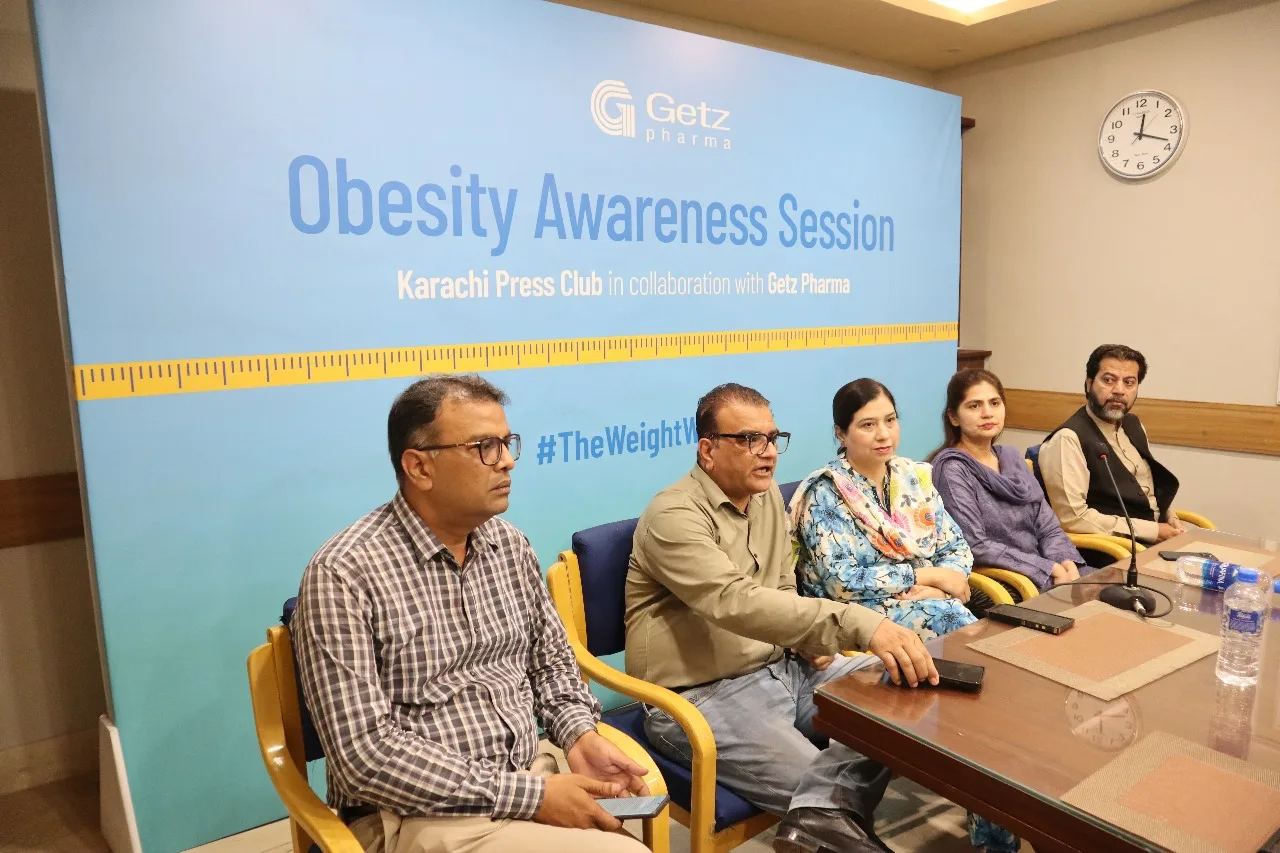
Health experts have sounded the alarm over the escalating obesity crisis in Pakistan, dubbing it the “mother of all non-communicable diseases.” During a recent briefing at a screening and awareness camp organized by the Karachi Press Club’s Health Committee, in collaboration with Getz Pharma, leading health professionals revealed troubling statistics about the nation’s growing waistlines.
Dr. Asma Ahmed, an endocrinologist at Aga Khan University Hospital, presented survey findings showing that 35 percent of women and 28 percent of children in Pakistan are obese, with over 80 percent of adults having excessive waist circumference. This rising obesity is quietly triggering a national health emergency, causing early deaths in men, infertility in women, and long-term complications in children.
Obesity is increasingly being recognized as a disease in itself, rather than just a lifestyle issue. It is linked to several other health problems, including hypertension, diabetes, infertility, and organ damage.
Dr. Asma stressed that children’s sedentary lifestyles, marked by excessive screen time, junk food consumption, and poor sleep habits, are driving the obesity epidemic. She described this phenomenon as raising a generation that is both obese and malnourished. In addition to obesity, the prevalence of hypertension remains a major concern.
Dr. Asma warned that many individuals remain unaware of their high blood pressure, a condition that, when left untreated, can cause severe damage to vital organs such as the kidneys, heart, and brain. Infertility in women, too, has been increasingly linked to obesity and hormonal imbalances, with Dr. Asma urging families to adopt healthier eating habits by choosing home-cooked meals over processed foods. “Sudden lifestyle changes like sleeping late, lack of physical activity, and fast food consumption are pushing people toward a health disaster,” she said.
Dr. Nazish Butt, head of Gastroenterology and Hepatology at Jinnah Postgraduate Medical Centre (JPMC), echoed Dr. Asma’s concerns, emphasizing that obesity must be treated as a serious disease leading to conditions like diabetes, high cholesterol, heart disease, and stroke. She highlighted the growing obesity problem among women and children in Karachi, exacerbated by sedentary habits and the increased availability of junk and frozen foods. Dr. Butt stressed the need for a community-driven effort to address the crisis, advocating for lifestyle reforms to encourage physical activity and better food choices.
The event at the Karachi Press Club included free health screenings and consultations for members and their families. Muhammad Munsif, Joint Secretary of the Karachi Press Club, along with Health Committee Secretary Hamid-ur-Rehman, and representatives from Getz Pharma, were also present at the camp.
Dr. Wajiha Javed, Public Health Expert at Getz Pharma, shared the alarming results of the Pak Sehat baseline demographic survey, which revealed that over 80 percent of women and 70 percent of men in Pakistan are obese. “Around 50 percent of adults have hypertension, and one in three is diabetic,” she said, further underscoring the urgency of tackling obesity and its related conditions.
To combat these issues, Getz Pharma has launched the PREACH initiative—a three-year national program aimed at screening undiagnosed hypertension, raising disease awareness, and creating referral pathways to healthcare professionals. This initiative is focused on tackling obesity as a major metabolic disorder affecting the South Asian population. Dr. Wajiha also mentioned the introduction of medications like semaglutide and tirzepatide in Pakistan, which can help support lifestyle changes for individuals with a BMI over 30, or over 27 with a related condition like diabetes or hypertension.
Experts conclude that the obesity crisis is no longer just an individual health issue but has become a national crisis requiring urgent attention. Public awareness, early screening, and a cultural shift toward healthier living are critical to mitigating the impact of obesity on Pakistan’s future health.
This post was last modified on May 16, 2025 2:01 pm
A speedboat stolen from a Florida property entered Cuban waters with lethal intentions Wednesday, sparking…
Pakistan Prime Minister Shehbaz Sharif emphasized on Thursday that the Pakistan Armed Forces are fully…
Pink and her husband Carey Hart have ended their 20-year marriage after years of separation…
In rural Ghotki district, a recent rash of deaths has brought renewed attention to the…
ISLAMABAD (Reuters) - The Israeli military fired on groups of Palestinians in different areas of…
In Maddox Jolie's latest film role, it has been noted that he is being credited…
This website uses cookies.